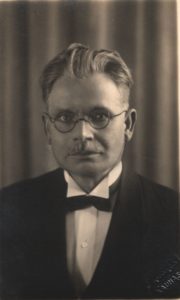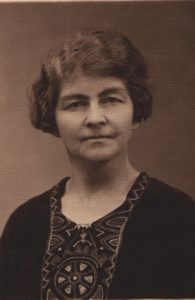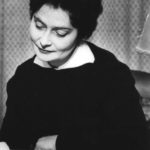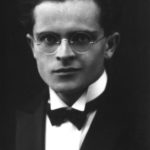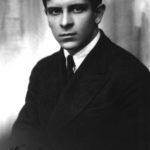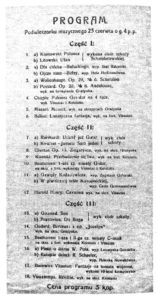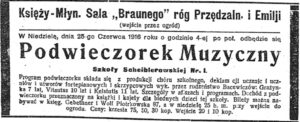Grażyna Bacewicz was born on 5 February 1909 in Łódź. She was the third child of parents of mixed nationality. Her father, Vincas Bacevičius, came to Łódź in 1899 from the so-called Užnemunė, part of Lithuania west of the Nemunas River with a largely indigenous Lithuanian population. In 1893 he graduated from a teachers’ college in Veiveriai (Wejwery). The college was a centre of the reviving Lithuanian national movement, which was the reason why its graduates, even those not actively involved in politics, were sent by the tsarist authorities to Poland – hence Bacevičius’ arrival in Łódź. At the college he was given the basic musical education and played the violin in the school orchestra. After arriving in Łódź he completed his musical studies at the Brothers Hanicki’s school and private courses. This then enabled him to start working as a teacher of general and musical subjects.
In the early 20th century Vincas Bacevičius met Maria Modlińska, who came to Łódź. Nothing is known about the circumstances of this encounter; perhaps they met at one of the musical soirées organised by Łódź industrialists? Maria came from a family of landowners with long traditions and many connections. The father of Maria and her four siblings, Stanisław Modliński, was an engineer who contributed greatly to the modern expansion of Warsaw; he worked, for example, on the construction of the Kierbedź Bridge and the Water Filters. The financial situation of the household in which Grażyna’s mother was brought up made it possible to provide the children with very good – for the standards of the period – education. The children’s formation was also influenced by their parents’ love for music. Maria’s mother, Natalia née Zdzitowiecka, was a pupil of Zygmunt Noskowski and Aleksander Michałowski. She performed in public at charity concerts. It could be said that the future composer and violinist, Grażyna Bacewicz, had her talent and love for music in her genes.
The idyll of her mother’s family home ended with the nearly simultaneous early death of Mr and Mrs Modliński. The siblings went their separate ways; Maria, an ambitious young woman, began a life on her own. After completing a course in administration and economics, she worked in the Warsaw branch of the Bank of Saint Petersburg. Then she moved to Łódź, where could rely on the help of her father’s family, and began working for the Łódź branch of the Ludwik Spiess and Son company. In Łódź she met the young man from Lithuania. Something in this stubborn Lithuanian must have bewitched her, if she decided to make a “mésalliance” – according to the criteria applied at the time.
- Vincas Bacevičius, Grażyna Bacewicz’s father, 1920s (PWM)
- Maria Modlińska, Grażyna Bacewicz’s mother, 1930 (PWM)
The marriage of Maria Modlińska and Vincas Bacevičius took place in 1903 in Warsaw’s Capuchin Church, Maria’s parish. They newlyweds settled in Łódź. Their first son, Keistutis (Kiejstut) – the future chamber pianist, composer and teacher – was born on 13 June 1904. 9 September 1905 was marked by the birth of Vytautas (Witold), who would become a composer, pianist and musical activist, eventually ending up on the other side of the Atlantic. On 5 February 1909 the couple had their first daughter, Grażyna, the future violinist, composer, pianist and teacher. Their last child, Wanda, was born on 10 August 1911. She was the only one among the siblings who, despite advanced musical studies, chose a non-musical career, devoting herself to literature and journalism. She also became a guardian of her sister’s oeuvre, collecting her manuscripts and often serving as her private secretary. As their father wished, the children were given Lithuanian names, with only Wanda being a compromise choice.
- Portrait of Wanda Bacewicz (PWM)
- Portrait of Vytautas Bacevičius (Paris 1928) (PWM)
- Portrait of Kiejstut Bacewicz, 1926 (PWM)
When the eldest of the siblings, Kiejstut, was asked about their dual national identity, he replied in his characteristic matter-of-fact way:
How did this Polish-Lithuanian home looked from the inside? It’s true that when we were children our daily life was influenced by the Polish cultural tradition, that we all spoke Polish at home and attended Polish schools. But it is also true that the Lithuanian national element, too, was an element of our home and that it must have contributed to the shaping of our minds. Our father was for us a living embodiment of this element and the Lithuanian cultural tradition. Our father’s influence and our summer holidays spent in Lithuania with his family made this country emotionally close to us as well. Thus in our minds and in our imagination the Lithuanian element, alongside the Polish element, was always very much alive.
Kiejstut Bacewicz, “Mój brat Witold”, Ruch Muzyczny, 1986, no. 16, p. 17.
Kiejstut described the atmosphere in the family home and the beginnings of the children’s education in a similar manner:
The development of the personalities of all four of Vincas and Maria’s children’s […] was determined to a large extent by the atmosphere of their family home. I believe that this atmosphere and the efforts of both our parents largely determined the directions of our future actions and the paths we followed in our lives. Both our parents brought us up in the cult of scholarship, art and creative work, of human values in general. In other words, our parents were exceptional guides – with open minds, open hearts and strong characters to boot. It was our father, helped by our mother, who imbued us with interest in and passion for music, and opened the world of art to us; from early childhood he taught every one of us to play two instruments – the violin and the piano (plus the cello in my case) – as well as basic theory of music, then teaching us the discipline of collective music making and establishing family chamber ensembles. As a result he prepared us very well for our future studies at the Helena Kijeńska-Dobkiewiczowa Conservatory of Music in Łódź. Moreover, he began to prepare us for public performances when we are children. There still exists the programme and press material from Grażyna’s, Witold’s and my debut in 1916. During that concert the ten-year-old Witold performed his own ‘Fantasia on War Themes’ on the piano, scoring his first public success as a composer.
As the printed programme suggests, Grażyna performed during the concert as a pianist and violinist.
- Programme of a “musical afternoon” featuring the Bacewicz siblings, 1916
- Press note on the Bacewicz siblings’ performance at the Braun Hall in Łódź (Gazeta Łódzka, 1916)
On 27 June 1916 Nowy Kurjer Łódzki published a short account of the concert. It was the first review of the young musicians:
A musical afternoon.
On Sunday at 4 p.m. The Braun Hall at ul. Przędzalniana 64 was the venue of a musical afternoon organised to raise funds for poor pupils from the Szeibler School. The programme featured choral numbers and recitations by the pupils as well as musical performances by the Bacewicz siblings, 7-year-old Grażynka, 11-year-old Kieistutis and 10-year-old Vitautas, whose piece ‘War Fantasias’ was admired by the large audience. There was no end to the applause.
(kj.)
Those first musical experiences were touched upon by Grażyna Bacewicz herself in two stories from the collection Znak szczególny (A Distinguishing Mark).With warm understanding she recalls the ideas of her quite overbearing father, who did not spare his children music even in their sleep and forced them to practise. The youngest, Wanda, protested many times.
Just me: they tell me to practise, so I practise, they tell me to play scales, I play scales. But it’s boring. I should have rebelled. When I think about those years, the feeling that overwhelms is akin to shame. It concerns only me and in no way does it clash with the gratitude I have, all four of us have, towards our ‘mad’ parents.
